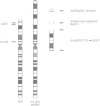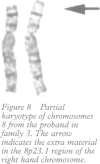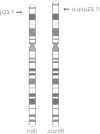Abstract
We present seven families with a cytogenetic duplication of the short arm of chromosome 8 at band 8p23.1. The duplication has been transmitted from parents to offspring in four of the seven families. In three families, the source of the extra material and its euchromatic origin were established using FISH with a YAC which was mapped to 8p23.1 and a whole chromosome paint for chromosome 8. FISH signals from this YAC were significantly larger on the duplicated chromosome compared with the normal chromosome in all six family members tested. Comparative genomic hybridisation (CGH) on a representative subject was consistent with these results. The families were ascertained for a variety of mostly incidental reasons including prenatal diagnosis for advanced maternal age. The transmission of this duplication by multiple phenotypically normal family members with no history of reproductive loss suggests the existence of a novel class of 8p23.1 duplications, which can be regarded as euchromatic variants or duplications with no phenotypic effect.
Full text
PDF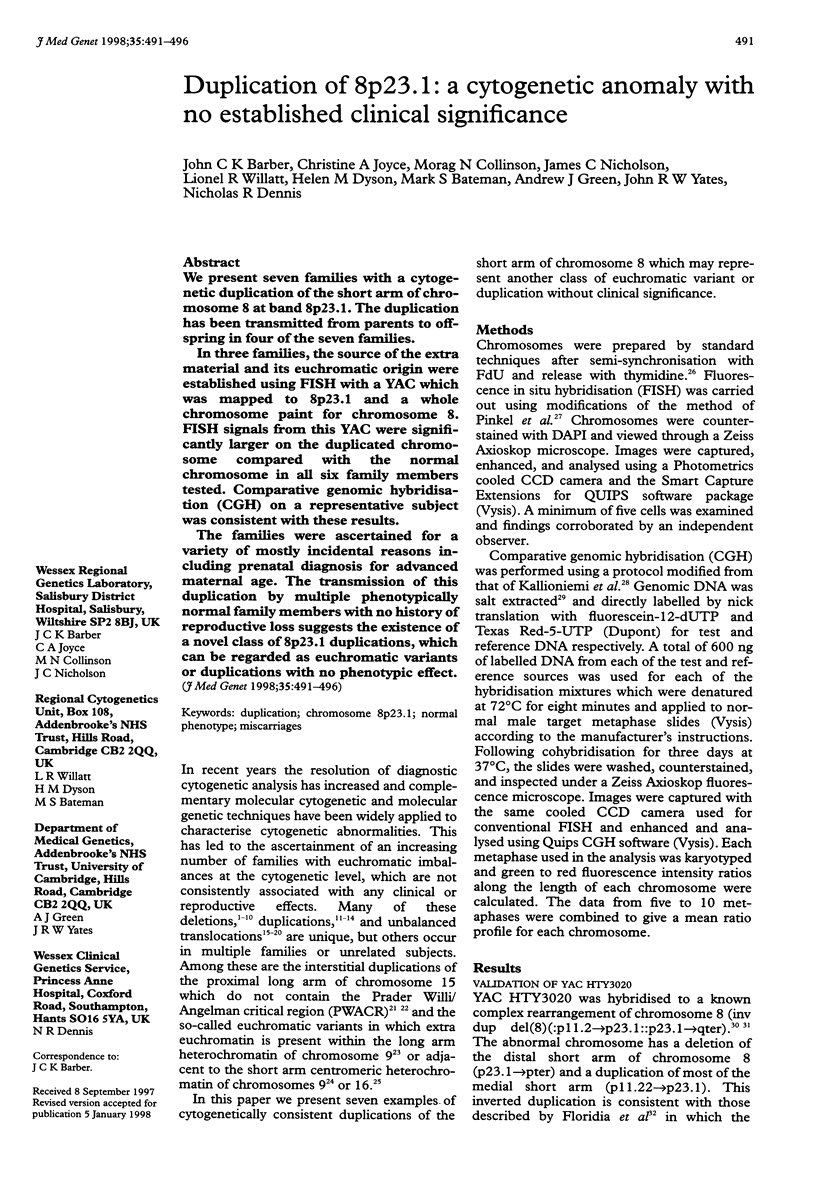
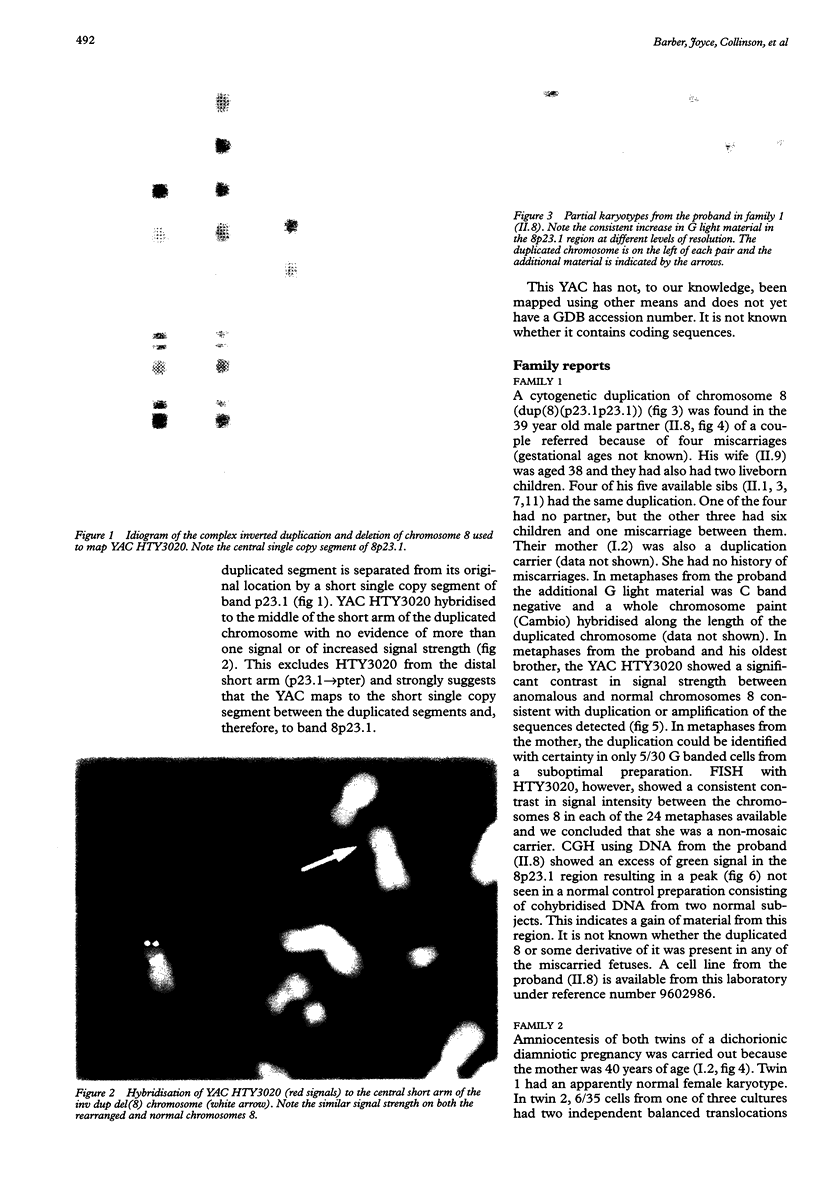
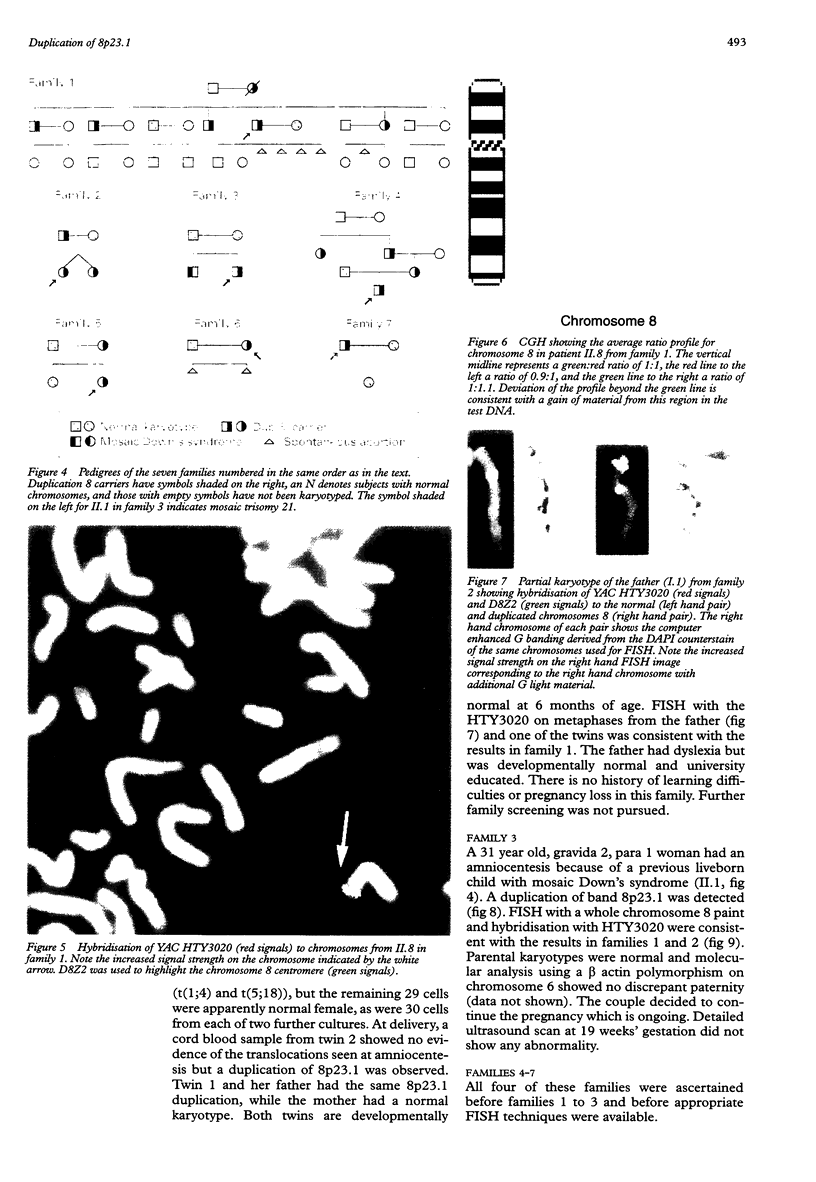
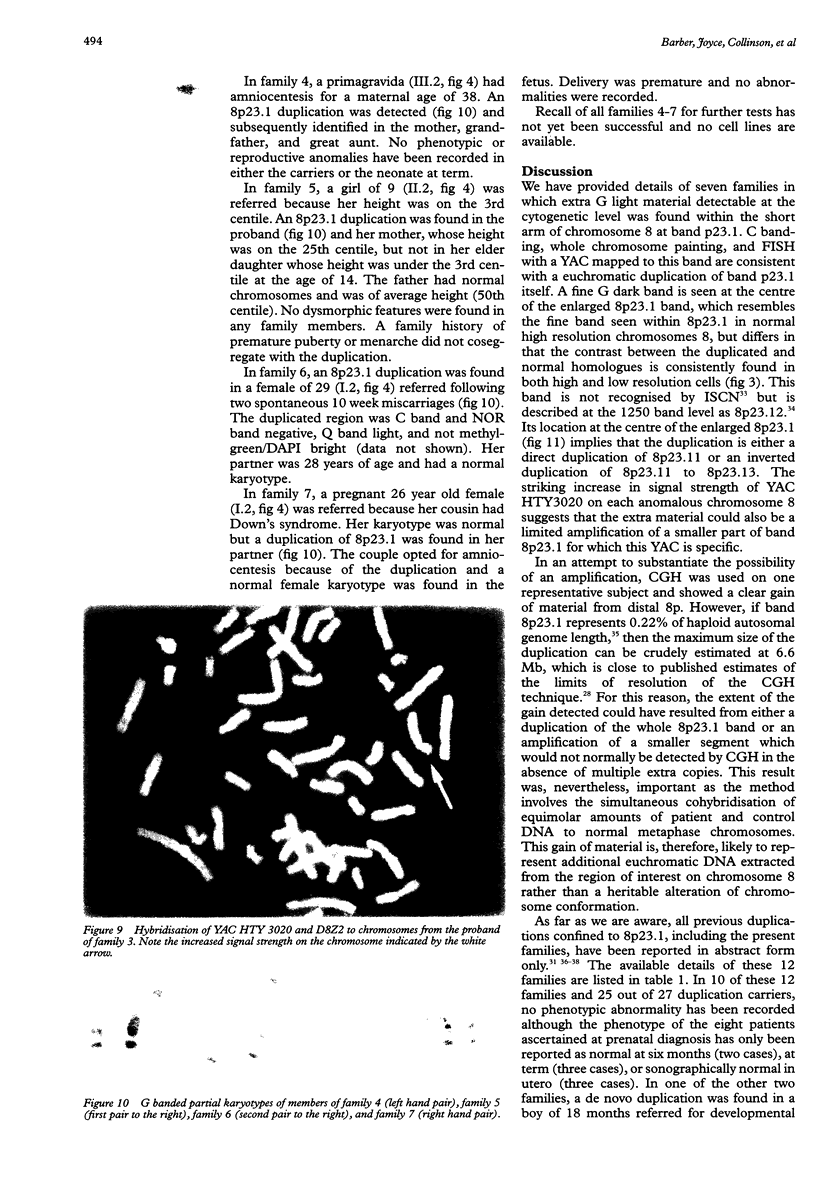
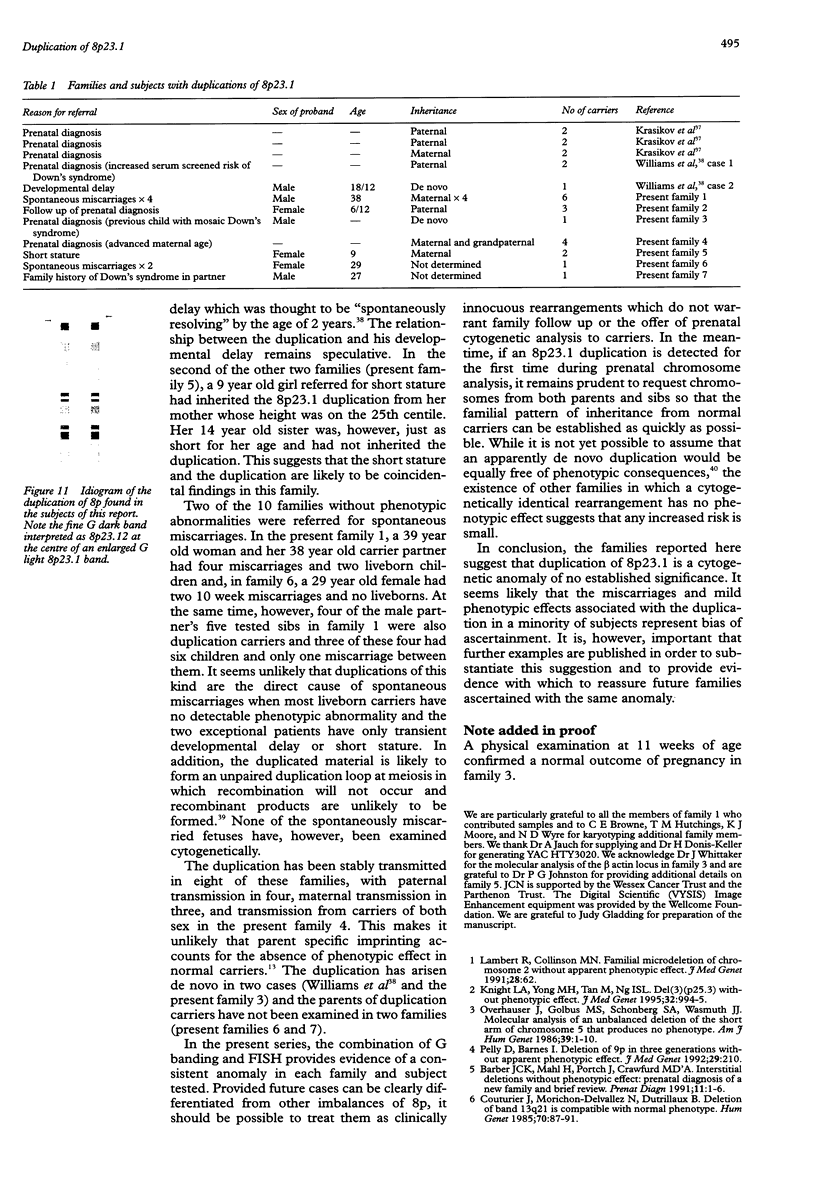
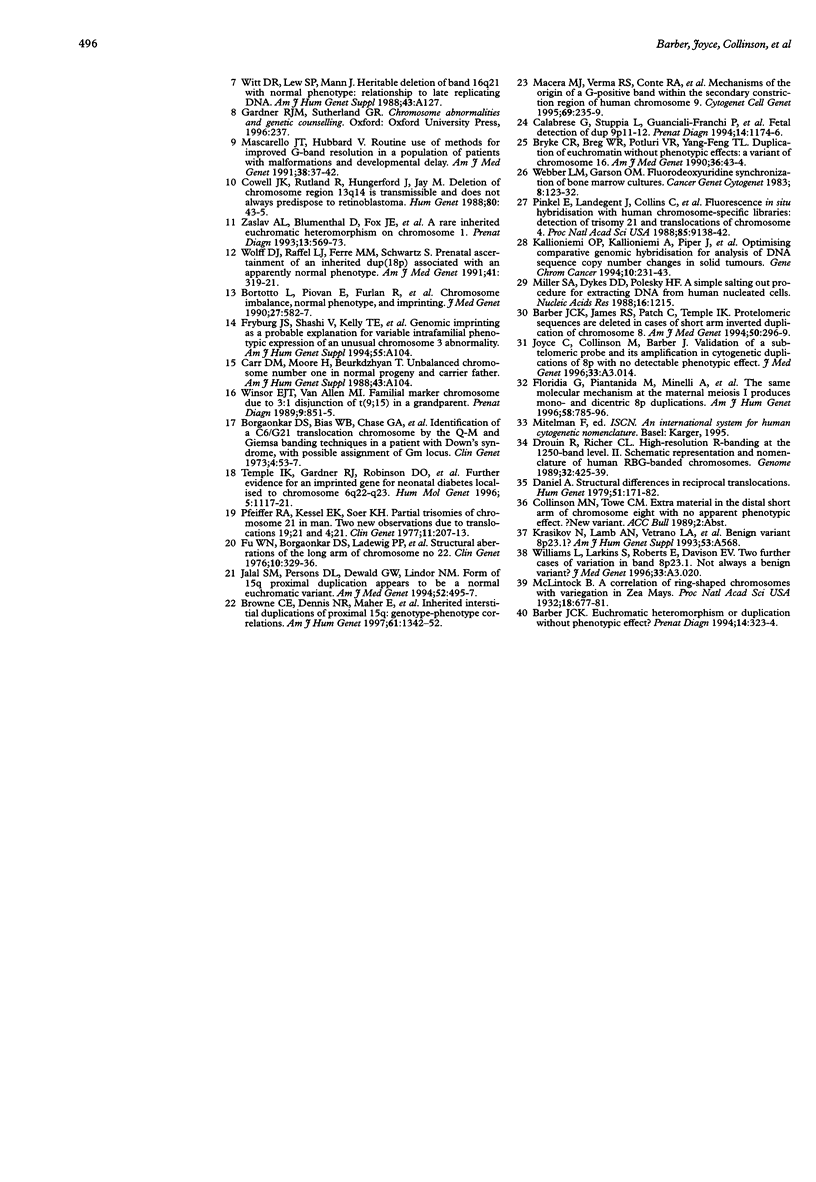
Images in this article
Selected References
These references are in PubMed. This may not be the complete list of references from this article.
- Barber J. C. Euchromatic heteromorphism or duplication without phenotypic effect? Prenat Diagn. 1994 Apr;14(4):323–324. doi: 10.1002/pd.1970140418. [DOI] [PubMed] [Google Scholar]
- Barber J. C., James R. S., Patch C., Temple I. K. Protelomeric sequences are deleted in cases of short arm inverted duplication of chromosome 8. Am J Med Genet. 1994 Apr 15;50(3):296–299. doi: 10.1002/ajmg.1320500315. [DOI] [PubMed] [Google Scholar]
- Borgaonkar D. S., Bias W. B., Chase G. A., Sadasivan G., Herr H. M., Golomb H. M., Bahr G. F., Kunkel L. M. Identification of a C6-G21 translocation chromosome by the Q-M and Giemsa banding techniques in a patient with Down's syndrome, with possible assignment of Gm locus. Clin Genet. 1973;4(1):53–57. doi: 10.1111/j.1399-0004.1973.tb01122.x. [DOI] [PubMed] [Google Scholar]
- Bortotto L., Piovan E., Furlan R., Rivera H., Zuffardi O. Chromosome imbalance, normal phenotype, and imprinting. J Med Genet. 1990 Sep;27(9):582–587. doi: 10.1136/jmg.27.9.582. [DOI] [PMC free article] [PubMed] [Google Scholar]
- Browne C. E., Dennis N. R., Maher E., Long F. L., Nicholson J. C., Sillibourne J., Barber J. C. Inherited interstitial duplications of proximal 15q: genotype-phenotype correlations. Am J Hum Genet. 1997 Dec;61(6):1342–1352. doi: 10.1086/301624. [DOI] [PMC free article] [PubMed] [Google Scholar]
- Bryke C. R., Breg W. R., Potluri V. R., Yang-Feng T. L. Duplication of euchromatin without phenotypic effects: a variant of chromosome 16. Am J Med Genet. 1990 May;36(1):43–44. doi: 10.1002/ajmg.1320360110. [DOI] [PubMed] [Google Scholar]
- Calabrese G., Stuppia L., Guanciali-Franchi P., Mingarelli R., Palka G. Fetal detection of dup 9p11-12. Prenat Diagn. 1994 Dec;14(12):1174–1176. doi: 10.1002/pd.1970141215. [DOI] [PubMed] [Google Scholar]
- Couturier J., Morichon-Delvallez N., Dutrillaux B. Deletion of band 13q21 is compatible with normal phenotype. Hum Genet. 1985;70(1):87–91. doi: 10.1007/BF00389468. [DOI] [PubMed] [Google Scholar]
- Cowell J. K., Rutland P., Hungerford J., Jay M. Deletion of chromosome region 13q14 is transmissible and does not always predispose to retinoblastoma. Hum Genet. 1988 Sep;80(1):43–45. doi: 10.1007/BF00451453. [DOI] [PubMed] [Google Scholar]
- Daniel A. Structural differences in reciprocal translocations. Potential for a model of risk in Rcp. Hum Genet. 1979 Oct 1;51(2):171–182. doi: 10.1007/BF00287173. [DOI] [PubMed] [Google Scholar]
- Drouin R., Richer C. L. High-resolution R-banding at the 1250-band level. II. Schematic representation and nomenclature of human RBG-banded chromosomes. Genome. 1989 Jun;32(3):425–439. doi: 10.1139/g89-466. [DOI] [PubMed] [Google Scholar]
- Floridia G., Piantanida M., Minelli A., Dellavecchia C., Bonaglia C., Rossi E., Gimelli G., Croci G., Franchi F., Gilgenkrantz S. The same molecular mechanism at the maternal meiosis I produces mono- and dicentric 8p duplications. Am J Hum Genet. 1996 Apr;58(4):785–796. [PMC free article] [PubMed] [Google Scholar]
- Fu W., Borgaonkar D. S., Ladewig P. P., Weaver J., Pomerance H. H. Structural aberrations of the long arm of chromosome no. 22. Report fo a family with translocation t(11;22) (q25;q11). Clin Genet. 1976 Dec;10(6):329–336. doi: 10.1111/j.1399-0004.1976.tb00057.x. [DOI] [PubMed] [Google Scholar]
- Jalal S. M., Persons D. L., Dewald G. W., Lindor N. M. Form of 15q proximal duplication appears to be a normal euchromatic variant. Am J Med Genet. 1994 Oct 1;52(4):495–497. doi: 10.1002/ajmg.1320520421. [DOI] [PubMed] [Google Scholar]
- Kallioniemi O. P., Kallioniemi A., Piper J., Isola J., Waldman F. M., Gray J. W., Pinkel D. Optimizing comparative genomic hybridization for analysis of DNA sequence copy number changes in solid tumors. Genes Chromosomes Cancer. 1994 Aug;10(4):231–243. doi: 10.1002/gcc.2870100403. [DOI] [PubMed] [Google Scholar]
- Knight L. A., Yong M. H., Tan M., Ng I. S. Del(3) (p25.3) without phenotypic effect. J Med Genet. 1995 Dec;32(12):994–995. doi: 10.1136/jmg.32.12.994. [DOI] [PMC free article] [PubMed] [Google Scholar]
- Macera M. J., Verma R. S., Conte R. A., Bialer M. G., Klein V. R. Mechanisms of the origin of a G-positive band within the secondary constriction region of human chromosome 9. Cytogenet Cell Genet. 1995;69(3-4):235–239. doi: 10.1159/000133972. [DOI] [PubMed] [Google Scholar]
- Mascarello J. T., Hubbard V. Routine use of methods for improved G-band resolution in a population of patients with malformations and developmental delay. Am J Med Genet. 1991 Jan;38(1):37–42. doi: 10.1002/ajmg.1320380110. [DOI] [PubMed] [Google Scholar]
- McClintock B. A Correlation of Ring-Shaped Chromosomes with Variegation in Zea Mays. Proc Natl Acad Sci U S A. 1932 Dec;18(12):677–681. doi: 10.1073/pnas.18.12.677. [DOI] [PMC free article] [PubMed] [Google Scholar]
- Miller S. A., Dykes D. D., Polesky H. F. A simple salting out procedure for extracting DNA from human nucleated cells. Nucleic Acids Res. 1988 Feb 11;16(3):1215–1215. doi: 10.1093/nar/16.3.1215. [DOI] [PMC free article] [PubMed] [Google Scholar]
- Overhauser J., Golbus M. S., Schonberg S. A., Wasmuth J. J. Molecular analysis of an unbalanced deletion of the short arm of chromosome 5 that produces no phenotype. Am J Hum Genet. 1986 Jul;39(1):1–10. [PMC free article] [PubMed] [Google Scholar]
- Pfeiffer R. A., Kessel E. K., Soer K. H. Partial trisomies of chromosome 21 in man. Two new observations due to translocations 19;21 and 4;21. Clin Genet. 1977 Mar;11(3):207–213. doi: 10.1111/j.1399-0004.1977.tb01301.x. [DOI] [PubMed] [Google Scholar]
- Pinkel D., Landegent J., Collins C., Fuscoe J., Segraves R., Lucas J., Gray J. Fluorescence in situ hybridization with human chromosome-specific libraries: detection of trisomy 21 and translocations of chromosome 4. Proc Natl Acad Sci U S A. 1988 Dec;85(23):9138–9142. doi: 10.1073/pnas.85.23.9138. [DOI] [PMC free article] [PubMed] [Google Scholar]
- Temple I. K., Gardner R. J., Robinson D. O., Kibirige M. S., Ferguson A. W., Baum J. D., Barber J. C., James R. S., Shield J. P. Further evidence for an imprinted gene for neonatal diabetes localised to chromosome 6q22-q23. Hum Mol Genet. 1996 Aug;5(8):1117–1121. doi: 10.1093/hmg/5.8.1117. [DOI] [PubMed] [Google Scholar]
- Webber L. M., Garson O. M. Fluorodeoxyuridine synchronization of bone marrow cultures. Cancer Genet Cytogenet. 1983 Feb;8(2):123–132. doi: 10.1016/0165-4608(83)90044-4. [DOI] [PubMed] [Google Scholar]
- Winsor E. J., Van Allen M. I. Familial marker chromosome due to 3:1 disjunction of t(9;15) in a grandparent. Prenat Diagn. 1989 Dec;9(12):851–855. doi: 10.1002/pd.1970091205. [DOI] [PubMed] [Google Scholar]
- Wolff D. J., Raffel L. J., Ferré M. M., Schwartz S. Prenatal ascertainment of an inherited dup(18p) associated with an apparently normal phenotype. Am J Med Genet. 1991 Dec 1;41(3):319–321. doi: 10.1002/ajmg.1320410311. [DOI] [PubMed] [Google Scholar]
- Zaslav A. L., Blumenthal D., Fox J. E., Thomson K. A., Segraves R., Weinstein M. E. A rare inherited euchromatic heteromorphism on chromosome 1. Prenat Diagn. 1993 Jul;13(7):569–573. doi: 10.1002/pd.1970130706. [DOI] [PubMed] [Google Scholar]



